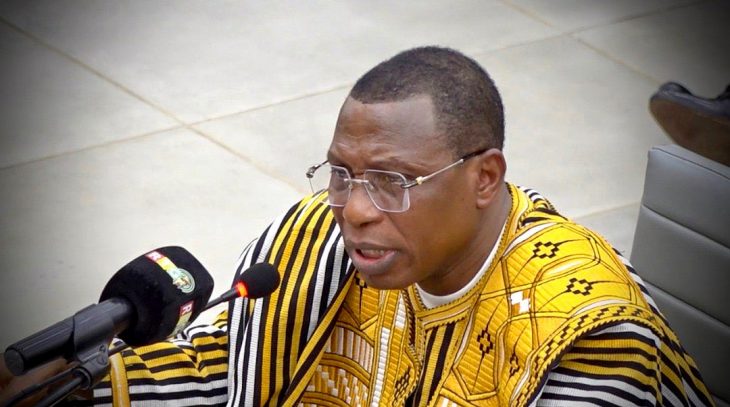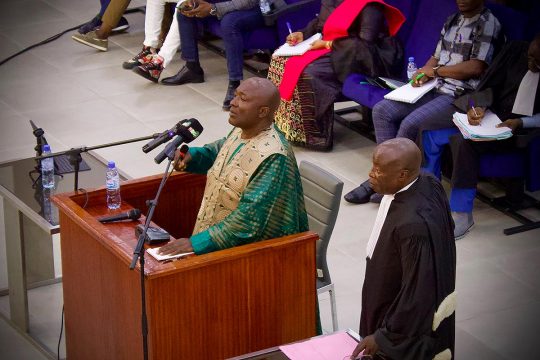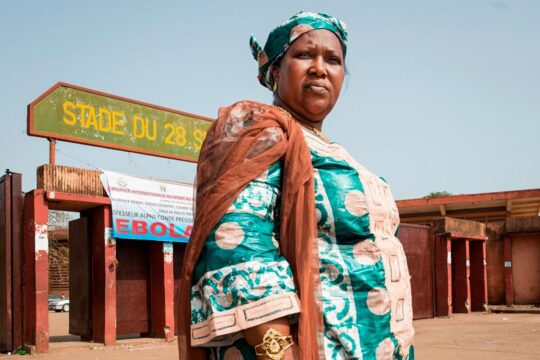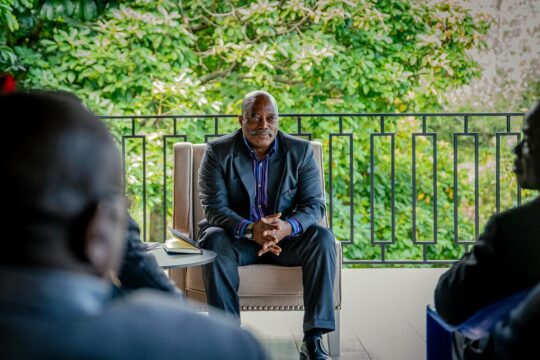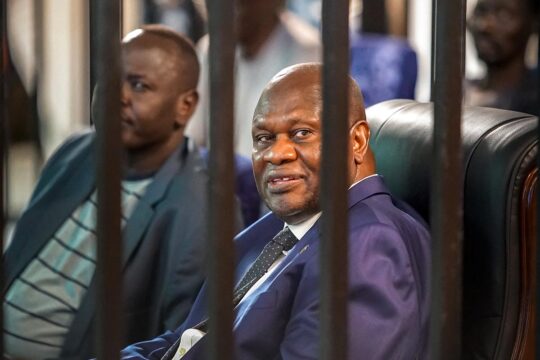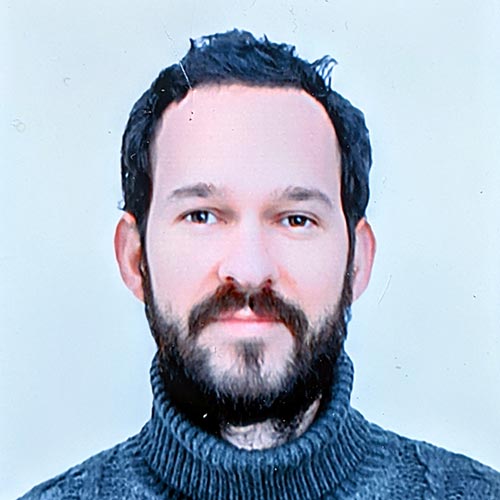"Mr. Moussa Dadis Camara, come to the stand!” The call by presiding judge Ibrahima Sory 2 Tounkara in the criminal court of Dixinn, a district of the Guinean capital, thundered out. This Monday, December 12, was already the second time that it resounded within these walls. The previous week, the appearance of the former head of the military junta in 2009-2010 had the effect of a damp squib. After seven minutes on the stand, Dadis Camara had just enough time to say that he was unable to speak for health reasons. The president of the court then gave him a week to recover. So this time, Guineans could finally hear the version of events of the man who was "head of state, president of the transition, and commander in chief of the armed forces" during the massacre in a stadium in Conakry in September 2009.
Dadis Camara moved slowly across the courtroom in a loose-fitting boubou with black, yellow and white stripes. The moment seemed excessively long. When he took the stand, he stated from the outset that he was there to "give [his] share of the truth”. He is the main defendant in the deadly repression of an opposition meeting that was crushed by soldiers and gendarmes and turned into a bloodbath. The violence left at least 156 people dead and more than 100 women raped, according to the final report of an international commission of inquiry.
Survivors and families of the victims have waited 13 years for the opening of this trial, which would not have the same significance without the presence of Moussa Dadis Camara. He returned from exile three days before the first hearing. "If I am here before you, Mr. President, you should know that it is my patriotism that has brought me here. Otherwise, I would not have agreed to come," he said. He came to clear his "honour", he says. "I am before you, Mr. President, before the people to tell you that this man who is before you is a sincere man, honest, patriotic!”
The ethnic question
Behind the microphone, Moussa Dadis Camara had trouble staying focussed. "Before talking about the events of September 28, 2009," he warned, "we must make a small digression.” The digression lasted several hours. The former junta leader first wanted to recall his ancestry. His father was "a man who did not know ethnicity", he told the court. "Dadis Camara is not false, Dadis Camara is generous because he recognizes his ancestors," he said, speaking of himself in the third person, as if to become his own lawyer. "I would like to tell you that during all the time I spent in the dock, I was disturbed. There were statements that made me look like something else." In particular, he was targeting his former aide-de-camp, Aboubacar Diakité, known as "Toumba", who denounced his rule on the stand, describing him as locked into ethnic considerations and directly accusing him of the massacre. "You will see, Mr. President, when I go into detail, that all the allegations that Mr. Toumba Diakité made are not based on a solid structure like the pyramid of the first Pharaoh Keops and the second Pharaoh Kephren and the third Mykerinos, whose structures hold up to the present.”
Moussa Dadis Camara was often difficult to follow, going from one idea to another without logical link, making a speech that was sometimes obscure. He recounted that a few days before September 28, 2009, "old sages from theocratic Fouta" came to see him to ask him to go to this region in central Guinea, inhabited mainly by the Peuls, one of the country's largest ethnic groups. “I didn't want to go to Fouta because when a man takes power, he must first go to the village to see his relatives and seek their blessing," said the accused. “But I thought it would be good to do so to avoid falling into ethnocentrism."
Toumba versus Dadis
The former head of state then started disclosing what he said were his actions on the day of the massacre. Until now, it was his co-accused who had recounted them in bits and pieces. Claude Pivi, the minister in charge of presidential security at the time, said during his appearance that he had had a meeting with Toumba in the middle of the day to warn him of the violence at Conakry's stadium. Toumba had assured him that he had seen Dadis in the morning in a state of anger. While the opposition had decided to organize its meeting at all costs to denounce the possible candidacy of Dadis Camara for the presidency, the latter had ranted: "They will regret it, the power is in the street, we must subdue them!” According to Toumba, this was the signal for the start of the killings.
The story recounted by Dadis Camara was quite different. He claims to have returned "very late" from Fouta, on the night of September 27 to 28. The next morning, he said he was awakened at around "10-11 am" by Joseph Makambo, his operations officer, who had come to warn him that a "big demonstration" was underway. "I left my office, I said I was going to go and calm the population down. I thought that this population liked me. Toumba forced me to come back to my office. In the meantime, someone came to tell me that there was a group that had left for the stadium. This group was led by Toumba and there were deaths. I was furious! In my anger, I immediately said to myself that I had to arrest him.” But he didn't do it and explained why: "In all sincerity, I was going to arrest him, but when he came back he was hiding grenades under his parka. I couldn't arrest him, he had an arsenal with him.”
Dadis believes that the stadium massacre was cleverly "orchestrated" by his aide-de-camp, to make him (Dadis) "unpalatable", to "sully him before the international community, before the Guineans so that Sékouba Konaté [then Minister of Defence] could organize elections and give power to whomever he wanted”. "This in fact is what he did. He organized elections as a front," he added, referring to the 2010 presidential election that saw the victory of Alpha Conde. "It was Cellou Dalein Diallo [who came second in the elections] who won those elections, a knockout blow," he said. He denounced a plot in which Alpha Conde himself had participated.
Dadis camara loses his voice
Sure of himself, the former president came to the stand with a file that he handled and placed in front of him mechanically before speaking again. "Who said even once that Moussa Dadis gave orders to go to the stadium? To my knowledge, until proven otherwise, no one. Among all those who have come before your august tribunal, no one.”
There is no question of him feeling guilty. "When I saw Mr. Toumba come to this court, Mr. President, to say that I must ask for forgiveness... What forgiveness will I ask for?” He proclaims his innocence and is convinced that the court will pronounce his acquittal. "I know that you will free me, Mr. President!" he cried, provoking laughter from the audience.
The court president was obliged to intervene several times to restore calm to the hearing. "If you continue like this we will be obliged to clear the room,” he said. “This is not a theatre, so if you can't pull yourself together, please leave.”
But Dadis Camara continued his antics before an impassive court. "No one is going to joke with the referral order that brings me here before you, Mr. President," he said while grabbing some of the sheets laid out before him. "I will remain adamant! Anyone who is going to ask me questions here, let them ask me about complicity."
The next day, at the beginning of his interrogation, the prosecutor put Dadis Camara in his place. "We will ask you any question that may enlighten the court,” he said. “You have no special status, you are accused in the same way as those who preceded you.”
On December 13, at midday, the court president interrupted the prosecutor and asked the accused if he was still able to continue. "It is difficult to hear you," he said. Dadis Camara's voice was now just a hoarse breath. The hearing was finally suspended, and the case was postponed to December 19. On that day, the prosecutor and his deputies will continue their questioning. It will then be the turn of lawyers for the civil parties and defence to ask questions. The strongest opposition could well come from the counsel for the co-accused, since the non-aggression pact concluded within the defence before the trial was shattered several weeks ago.


